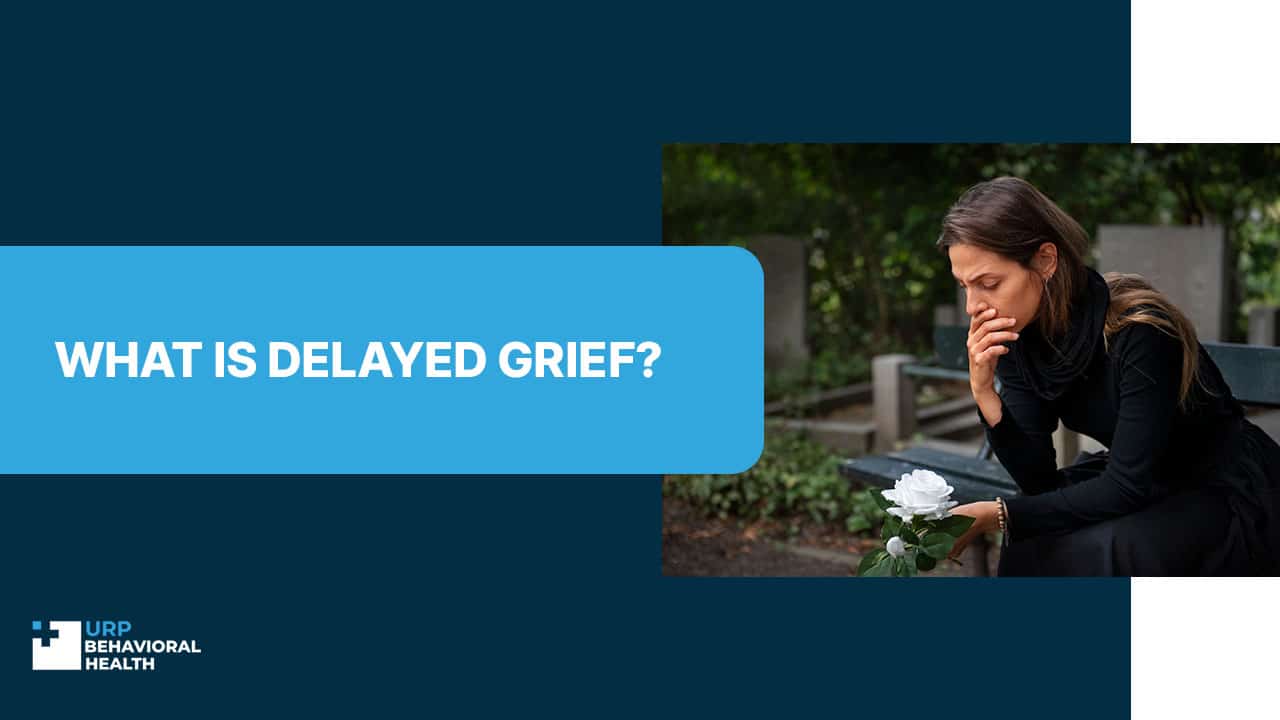
What is Delayed Grief?
Complicated grief is when grieving is done after a certain period has elapsed due to many reasons. Post-bereavement reaction: it was revealed, in this spectrum, as delayed grief reaction which may occur weeks or even years after the death of a loved one or after any form of critical change in the normal life of a person.
An important characteristic of this type of mourning is that the staking and other usual reactions to the loss do not occur at once but may become noticeable only after some time. It is only at the time when the first wave of the shock or the non-acknowledgment and minimization of the tragedy strikes back, does the grief captures those who are mourning fully. They come in cycles, gradually building and reaching their peak at some levels or something can just happen and make the grief acute again [4].
When Does Delayed Grief Show Up?
Your feelings after a loss may be spaced out as you slowly try to come to terms with what has occurred. At least, it allows having some understanding of why one got a certain feeling even though it may be impossible to affect the process:
- As for the first reaction after the loss it is “This is not happening”. You feel shocked or numb. This phase is the brief attempt to restore an objective response to the emotions that are too difficult to handle.
- Anger. In the cross, when people realize the sting of the loss, anger is experienced. On the cross, whenever they realize the sting of the loss, anger is experienced. It can be targeting other people or fate and even life itself. It is perfectly acceptable to be angry with the deceased because they have abandoned you.
- Bargaining. During this phase, you consider what you could have done that would have made the loss not to have occurred. These are thoughts with phrases like If only I had …… or maybe if …… Some opt to make a ‘bargain’ with a power greater than to reverse the loss.
- Depression. Regret comes right after the initial elation as soon as one cogitates over the pinch the passing of the person has dealt his or her lifetime. Stress indicators of this phase are crying, inability to sleep, and loss of appetite. You get stressed, you wish you could undo a few things that have occurred and you suffer from loneliness.
- Acceptance. In the final stage, you make the reality of the loss piece with this knowledge and belief. The pain is always still there, but slowly look forward to rebuilding your life again.
These phases go through various stages depending on the individual. The phases can be done in sequence from one to another, or some may be done simultaneously while some can be omitted completely [5].
Contact our admissions team now to begin your path toward a brighter future.
Is Delayed Grief a Thing Caused by Triggers?
The reasons can range from a loss like the bereavement of a loved one or a breakdown of a relationship after divorce to alteration such as moving house or job change, or childhood unresolved issues like physical or emotional abuse or neglect. Other types of stressors include physical malaise, financial woes, and relationship issues.
The following are significant: people get gripped in different ways, no matter the cause of grief. While there is no correct method of handling the pain – often, the emotions take several weeks to surface.
In the last Black Panther movie known as “Wakanda Forever”, the director analyzed the main character’s death, Chadwick Boseman. The screenwriters were able to illustrate how painful it can be to work through the guilt and shame of a loss. Hate feelings can be often transformed into anger – and aggression which is always oriented toward the outside world. This may be because Chadwick broke the unspoken rule that the grieving process must be personal; only the handful of people close enough to console the bereaved would even consider talking about the process [3].
Signs and Symptoms of Delayed Grief
Those who take too long to begin grieving, may feel a strong desire for the dead person or even spend most of the time thinking of the dead. Participants in this category especially children and adolescents shift emphasis to how the death occurred. There are also often moderate or severe levels of discomfort or borderline incapability regarding basic and important activities of life – at home, at work, etc. Delayed grief is worse than normal since it hinders normal functioning just as any other normal grief would not.
The loss that has occurred for the diagnosis of the Prolonged Grief Disorder must have occurred one year before the diagnosis in adults, or six months before the diagnosis in children and adolescents. Before this, three or more of the following physical symptoms should occur on almost every day for at least a month:
- Existential pain, where such things as a part of a person’s substance feels like it has perished.
- The very intestinal conviction that they do not die.
- Emotional avoidance of memories related to the deceased person.
- Any extreme feelings associated with the particular loss including anger, bitterness, and the feeling of sorrow.
- Essays describe challenges in readjustment to such a life (problems getting along with friends and acquaintances, pursuing hobbies as well as handling scheduling of the future).
- Diminished expressiveness. This includes the evidenced reduced emotions or even completely the eradication of expressions of emotional responses.
- Suicidal ideation is the desire or urge to die or wish to kill oneself.
- The major depressive episode with severe features characterized by vivid features excluding the ones linked with psychotic disorder and including intense loneliness (being alone or a feeling of aloofness from other people).
Of adults mourning the loss of a loved one, between 7-10% suffer from a persistent grief disorder, while the same percentage of children and adolescents might also be affected (American Psychiatric Association, 2021). As people age they are vulnerable to developing such a disorder and those with past symptoms of depression or bipolar disease are even more likely to experience it. Also at higher risk for developing complicated grief are caregivers, especially those who cared for a partner or who had depression before the loss.
PGD is comorbid with other mental health disorders, such as PTSD, anxiety disorders, or depression. Insomnia is very common; 30-70% of short-term and 10-56% of chronic sleep posterior sufferers are receiving bad sleep in the long term.
These distinctions are useful because, with the inclusion of the diagnostic criteria for PGD in the DSM-5-TR, professionals no longer have to sort through variations in grief in search of the core features that separate normal grief from this persistent and distressing form of grief [1].
We’ll help you understand your options and guide you toward care.
How Long Can Delayed Grief Last?
Delayed grief does not work on a timetable. This mourning process can start anywhere from the time of loss – days, weeks, months, or even years later. It fluctuates for one or another before it comes to an end or persists for a longer period depending on such factors as the type of the lost relationship, the nature of the lost relation, inner characteristics such as the subject’s personality, age, overall, and current health condition, coping strategies and social support.
Bereavement is an individual process and it is normal. The concept of delayed grief syndrome is expressed such that one may experience bouts of normalcy after which is faced with bouts of surreptitious grief. These feelings can return at some point in the lifetime for instance during the anniversary period, or making some kinds of memories.
Getting better does not mean improving gradually – there are moments when the feeling of loss is back and moments when it is gone. This is the kind of pain that does not have a time frame in terms of when you are expected to start healing [4].
How to Cope with Delayed Grief Years Later?
The best thing that you can do when you are grieving is to try and do all those things that are good for you. Rejection negates directly the energy as is evident when a major loss of energy and emotional strength is immediately dampened. Caring for your body and emotions will help you make it through this hard time:
- Facing your feelings. Typically, one can deny the feelings of grieving but they cannot deny them in the long run. To heal means to accept the suffering, which to some extent has already been done by victims. Denial of grief and sense of loss only delay grief and can cause such issues as depression, anxiety, addiction, or health issues.
- Sharing emotions and labeling them as arts. You may not be quite prepared in order to discuss the loss we need with other folks, it is less damaging to create it down and that could mean writing inside a journal. Or you can just express your feelings by making a photo album or participating in an organization that is connected with this type of loss.
- Preserve one’s interests. Routine can be comforting. Such activities will hence be useful for the individual to assist in sorting out their loss and hence minimizing grief.
- Accept your feelings. You have the right to feel a particular way and likewise, should not be bending someone else’s ways of feeling towards your wit. The process of grieving is unique and everyone doesn’t have to get to a point where they want to move on with their lives. It is perfectly all right to get angry, to scream out one’s abuse, or shed a tear.
- Taking care of your own health. Body and mind are connected. If your body is in good health, it will be easier for the soul to handle grief too. Stress and exhaustion can be fought with the help of enough sleep, a healthy diet, and regular exercise.
- Be prepared for triggers of grief. Important days such as birthdays, wedding anniversaries, or any other day or month can sometimes just bring back memories. That is entirely normal and expect such a moment to make those sorts of feelings bubble up again. To minimize the effects some things you can do include. Ensure that you don’t have to deal with it alone, or specially memorialize the loss.
This self-care and knowledge about you and what you are going through can then help to lessen the pain and find how to begin to let it go [2].
Conclusion
Delayed grief example is a multifaceted and quite often overlooked phenomenon which can be manifested in various forms and time frames. Being aware of our general stages, what can trigger this kind of reaction and the most frequent symptoms can be useful to manage this process of mourning better and to recognize our own emotions.
If you think that grief is changing your daily life and affecting your well-being, then it would be effective to turn to specialists. The professionals at URP Behavioral Health are willing and able to help you through this painful process with kindness and professionalism.
Our team will verify your insurance and design a plan tailored to your needs.
References:
- American Psychiatric Association. Prolonged Grief Disorder. Retrieved from https://www.psychiatry.org/patients-families/prolonged-grief-disorder
- HelpGuide. Coping with Grief and Loss. Retrieved from https://www.helpguide.org/mental-health/grief/coping-with-grief-and-loss
- Talkspace. Delayed Grief. Retrieved from https://www.talkspace.com/blog/delayed-grief/
- Verywell Mind. Can You Have a Delayed Reaction to Grief? Retrieved from https://www.verywellmind.com/can-you-have-a-delayed-reaction-to-grief-8425426#toc-signs-and-symptoms-of-delayed-grief
- WebMD. Grieving and Stages of Grief. Retrieved from https://www.webmd.com/balance/grieving-and-stages-of-grief#1-6
















